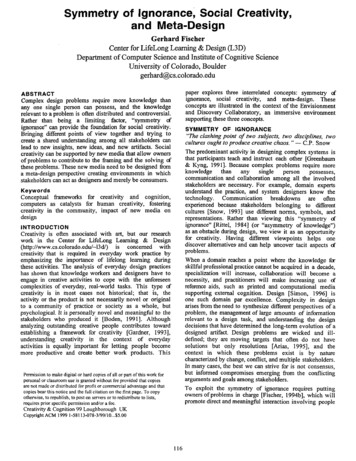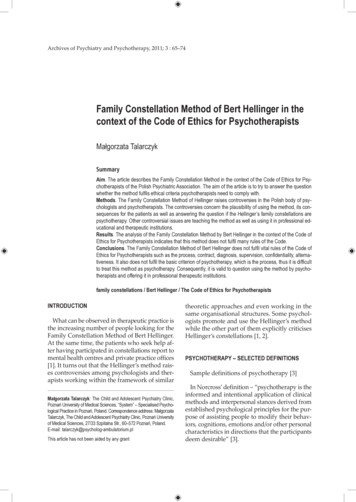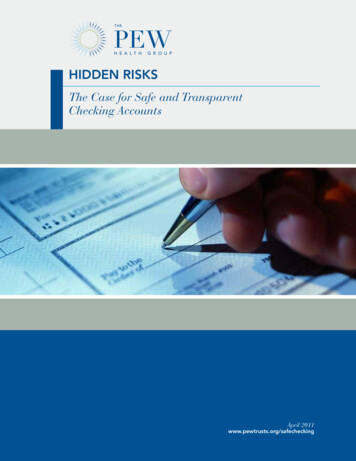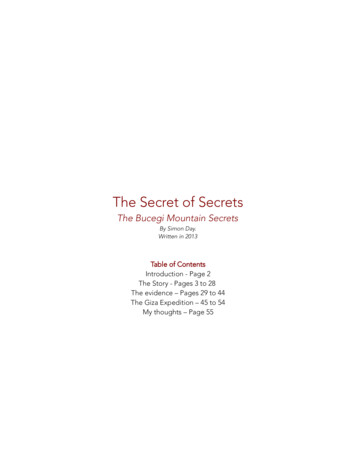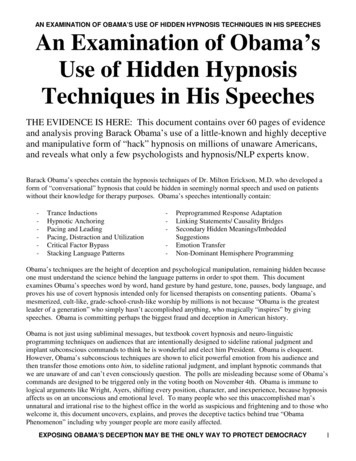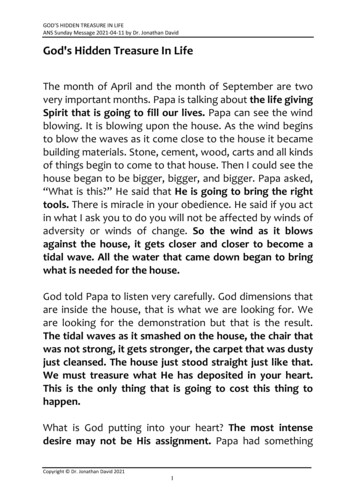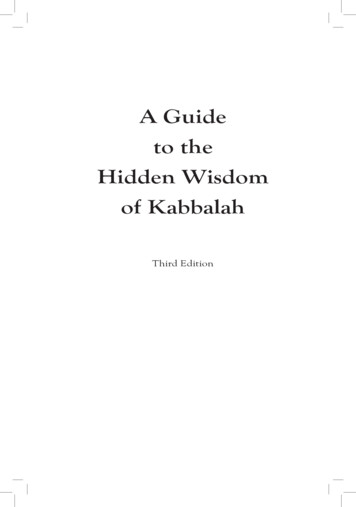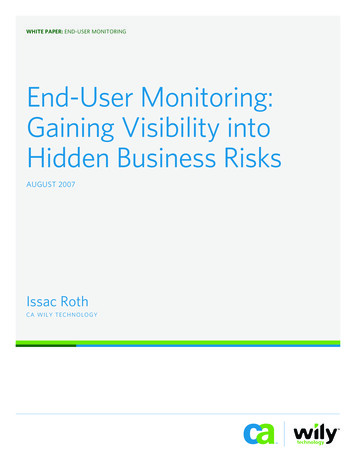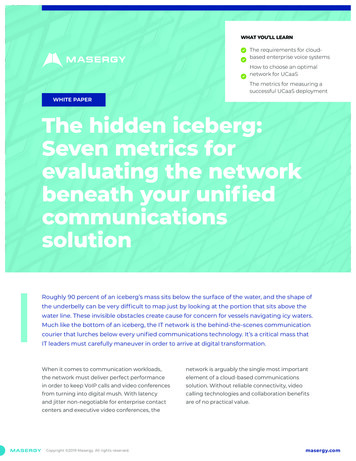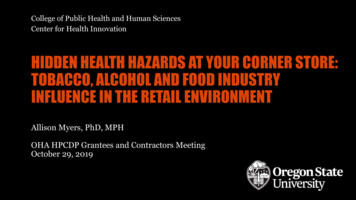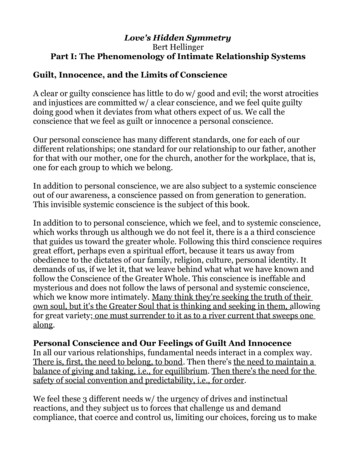
Transcription
Love's Hidden SymmetryBert HellingerPart I: The Phenomenology of Intimate Relationship SystemsGuilt, Innocence, and the Limits of ConscienceA clear or guilty conscience has little to do w/ good and evil; the worst atrocitiesand injustices are committed w/ a clear conscience, and we feel quite guiltydoing good when it deviates from what others expect of us. We call theconscience that we feel as guilt or innocence a personal conscience.Our personal conscience has many different standards, one for each of ourdifferent relationships; one standard for our relationship to our father, anotherfor that with our mother, one for the church, another for the workplace, that is,one for each group to which we belong.In addition to personal conscience, we are also subject to a systemic conscienceout of our awareness, a conscience passed on from generation to generation.This invisible systemic conscience is the subject of this book.In addition to to personal conscience, which we feel, and to systemic conscience,which works through us although we do not feel it, there is a a third consciencethat guides us toward the greater whole. Following this third conscience requiresgreat effort, perhaps even a spiritual effort, because it tears us away fromobedience to the dictates of our family, religion, culture, personal identity. Itdemands of us, if we let it, that we leave behind what what we have known andfollow the Conscience of the Greater Whole. This conscience is ineffable andmysterious and does not follow the laws of personal and systemic conscience,which we know more intimately. Many think they're seeking the truth of theirown soul, but it's the Greater Soul that is thinking and seeking in them, allowingfor great variety; one must surrender to it as to a river current that sweeps onealong.Personal Conscience and Our Feelings of Guilt And InnocenceIn all our various relationships, fundamental needs interact in a complex way.There is, first, the need to belong, to bond. Then there's the need to maintain abalance of giving and taking, i.e., for equilibrium. Then there's the need for thesafety of social convention and predictability, i.e., for order.We feel these 3 different needs w/ the urgency of drives and instinctualreactions, and they subject us to forces that challenge us and demandcompliance, that coerce and control us, limiting our choices, forcing us to make
commitments, whether we like it or not, to objectives that conflict with outpersonal wishes and pleasures.These needs constrain our relationships even while making them possible,because they both reflect and enable our fundamental human need to relateintimately to others. Our relationships succeed when we are able to fill theseneeds and to balance them with one another, and they become dysfunctionaland destructive when we can't. With every action we take that affects others, wefeel guilty or innocent. Just as the eye discriminates continually between lightand dark, so too an inner organ continually discriminates between what servesand what hinders our relationships.When our actions endanger or damage our relationships, we feel guilt, and wefeel freedom from guilt, or innocence, when our actions serve them. We call ourexperience of guilt and innocence—that is, our sense of what serves or endangersour relationships—personal conscience. Thus, our feelings of guilt andinnocence are primarily social phenomena that do not necessarily orient ustoward higher moral values On the contrary, by binding us so firmly to thegroups that are necessary for our survival, our feelings of guilt and innocenceoften blind us to what is good and evil.Different Needs Require Different BehaviorsOur needs for belonging, the equilibrium of giving and taking, and socialconvention work together to maintain the social groups to which we belong, buteach need strives toward its own goals with its own particular feelings of guiltand innocence, and so we experience guilt and innocence differently accordingto the need and the goal being served.Guilt feels like exclusion and alienation when our belonging is endangered.When it is well served, we feel innocence as intimate inclusion and closeness.Guilt feels like indebtedness and obligation when our giving are not balanced.When they are well served, we feel innocence as entitlement and freedom.Guilt feels like transgression and as fear of consequences or punishment whenwe deviate form a social order. We feel innocence with respect to social order asconscientiousness and loyalty.Conscience demands in the service of one need what it forbids in the service ofanother, and it may allow is in the service of one what it forbids in the service ofthe others. Conscience serves various needs even when they conflict with oneanother and we experience the conflicts between them as conflicts of conscience.Whoever reaches toward innocence with respect to one need simultaneouslyreaches toward guilt with respect to another. No matter how we struggle tofollow our conscience, we always feel both guilt and innocence—innocence withrespect to one need and guilt with respect to another. The dream of innocencew/o guilt is an illusion.Acting in the service our need to belong, conscience bonds us to the persons and
groups necessary for our survival regardless of the conditions they set for ourbelonging. Children accommodate w/o question to the groups into which theyare born and bond to them tenacity. Young children experience their bonding totheir family as love and good fortune, no matter how the family nourishes orneglects them, and they experience their family's values and habits as good, nomatter what the family believes or does.In the service of belonging, conscience reacts to everything that enhances orendangers our bonding. Our conscience is clear when we act so that ourcontinued belonging to our group is assured, and we have guilty consciencewhen we deviate from the norms of our group and fear that our right to belong isjeopardized or damaged: guilt and innocence have the same goal of keeping usconnected to our family and intimate community.The conscience that guards our bonding does not stand above the false beliefsand superstitions of the groups to which we belong or guide us to a greater truthbut serves and maintains those beliefs, making it difficult for us to see and knowand remember whatever it forbids. Since bonding and belonging are sonecessary for our survival and well-being, they dictate what we may perceive,believe, and know.We Have a Different Standard For Each GroupThe only criteria followed by conscience acting in the service of bonding are thevalues of the group to which we belong. Persons from different groups havedifferent values and persons who belong to several groups act differently in eachgroup. When our social context changes, conscience changes its colors to protectus in our new environment. We have one conscience w/ our mother, another w/our father; one for the family and another for the workplace; one for church,another for an evening out. In each situation, conscience strives to guard ourbelonging and protect us from abandonment and loss like a sheepdog holds thesheep together in a herd, barking and nipping at our heels until we movetogether w/ the others.But what leaves us innocent in one group may make us very guilty in anther. In agroup of thieves, members must steal and do so w/ a clear conscience. Inanother group, stealing is forbidden. In both groups, members experience thesame sensations of guilt or innocence as the penalty for violating their group'sconditions of membership.What serves one relationship may damage another. For example, sexuality is thefulfillment of one relationship and a violation of another. What happens whenour belonging in one relationship collides with our belonging in another is thatwe are simultaneously guilty in one of them and innocent in the other.Dependency Strengthens BondingConscience ties us most firmly to our group when we are most powerless and
vulnerable. As we gain power in a group and independence, both bonding andconscience relax. But if we remain weak and dependent, we also remain obedientand loyal. In families, children occupy this position; in a company, the loweremployees; in an army, the enlisted soldiers; in a church, the faithfulcongregation. For the good of the stronger in the group, they all conscientiouslyrisk health, happiness, and life and make themselves guilty—even when theirleaders, for what is called “higher purposes,” unscrupulously misuse them.These are the meek who stick out their necks for the stronger, the hangmendoing others' dirty work, unsung heroes holding their positions to the last, sheepfaithfully following their shepherd to the slaughter, victims paying restitution.These are the children who leap into the fray for their parents and relatives, whocarry out that which they didn't plan, atone for what they didn't do, and bearburdens they didn't create.Belonging Demands The Exclusion Of Those Who Are DifferentWherever conscience acting in the service of belonging binds us to one anotherin a group, it also drives us to exclude those who are different and to deny themthe right to the membership that we claim for ourselves. Then we becomefrightening for them. The conscience guarding our belonging guides us to do tothose who are different what we most fear as the worst consequence of guilt—weexclude them. But as we treat them badly in good conscience, so do they in turntreat us in the name of the conscience of their group. The conscience that guardsbelonging inhibits evil within the group, but lifts this inhibition in regard tothose outside the group. We then do to others in good conscience what ourconscience forbids us to do to members of our own group. In the context ofreligious, racial, and national conflicts, suspending the inhibitions thatconscience imposes on evil within a group allows members of that group tocommit, in good conscience, atrocities and murder against others who belong todifferent groups.Guilt and innocence are not the same as good and evil. We do destructive andevil things with a clear conscience when they serve the groups that are necessaryfor our survival, and we take constructive action with a guilty conscience whenthese acts jeopardize our membership in these same groups.The Appearances of Guilt and Innocence Can Be DeceivingGuilt and innocence often exchange their garb so that guilt appears as innocenceand innocence as guilt. Appearances deceive, and it's only by the final outcomethat we know the truth. The conscience of the group gradually shapes the child'sexperience of the world, coloring the child's perception of what is with thefamily's beliefs. Personal conscience becomes the great pretender, settingfeelings of guilt and innocence in the place of knowledge of good and evil. Thegood that brings reconciliation must overcome the false appearances created by
virtue of our belonging to various groups. Conscience talks; the world is.Conscience and Balance in Giving and TakingOur relationships—and our experiences of guilt and innocence—begin withgiving and taking. We feel entitled when we give and we feel obligated when wetake. The oscillation between entitlement and obligation is the secondfundamental dynamic of guilt and innocence in every relationship. It serves allour relationships, since both giver and taker know peace only when both havegiven and taken equally.When we receive something from someone, we lose our innocence andindependence. When we take, we feel indebted and beholden to the giver. Wefeel this obligation as discomfort and pressure, and we try to overcome it bygiving something back. We can't truly take anything without feeling the need togive. Taking is a form of guilt.Innocence in the service of this exchange becomes manifest as the comfortablefeeling of entitlement that comes when we take fully and then we give a littlemore in return than we've taken. We feel innocently carefree and lightheartedwhen we've taken fully and our needs have been satisfied, and when we've alsogiven fully in return.There are 3 typical patterns people adopt for achieving and maintaininginnocence with respect to exchange in relationships: fasting, helping, and fullexchange.FastingSome people cling to the illusion of innocence by minimizing their participationin life. Rather than taking fully what they need and then feel beholden, theyclose themselves off and withdraw from life and need. They feel free from needand obligation, and because they don't feel need, they need not take. Althoughthey feel beholden to no one and innocent, theirs is the innocence of theuninvolved observer. They don't get their hands dirty, so they often considerthemselves to be superior or special. Their enjoyment of life is limited by theshallowness of their involvement, and they feel correspondingly empty anddissatisfied.This posture can be observed in many people who struggle with depression.Their refusal to welcome what life offers develops first in the relationship w/ oneor both parents and is later carried over to other relationships to the good thingsof the world. Some people justify their refusal to take w/ the complaint that whatthey were given wasn't enough or was not the right thing. Others justify nottaking by pointing to the errors and limitations of the giver, but the result is thesame—they remain passive and empty. People who reject or judge their parents—regardless of what their parents may have done—typically feel incomplete andlost.
We observe the opposite in people who have succeeded in taking their parents asthey are, and in taking from them everything that was given. They experiencethis taking as a continuous flow of strength and nourishment that enables themto enter other relationships in which they, too, can take and give richly—even iftheir parents treated them badly.HelpingOther people try to maintain innocence by denying their need until after they'vegiven enough to
Bert Hellinger Part I: The Phenomenology of Intimate Relationship Systems Guilt, Innocence, and the Limits of Conscience A clear or guilty conscience has little to do w/ good and evil; the worst atrocities and injustices are committed w/ a clear conscience, and we feel quite guilty doing good when it deviates from what others expect of us. We call the conscience that we feel as guilt or .
